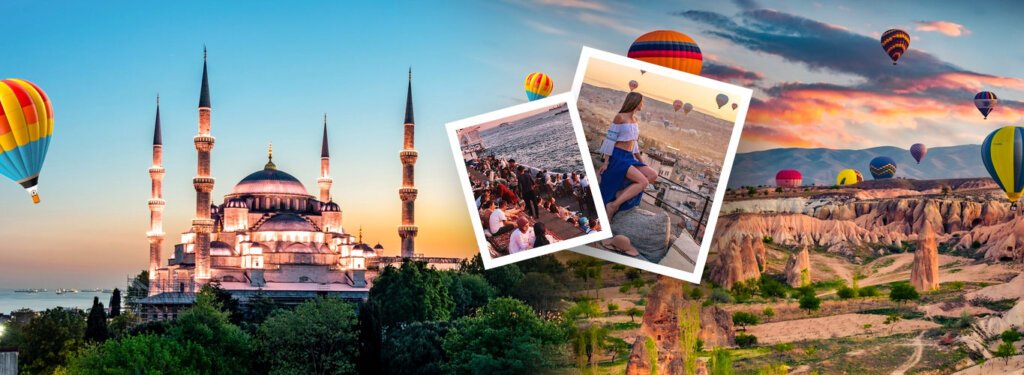
South India's No. 1 Travel Agency ✨
💱 Currency
Turkish Lira (TRY)
🗣️ Languages
Turkish
(English is commonly spoken in tourist areas)
🌤️ Climate
-5°C to 35°C (varies by region and season)
📅 Best Season
April – June (Spring)
September – November (Autumn)
🛡 Must-Know Travel Tips for Visiting Turkey
- 🏧 ATMs are widely available, especially in cities. Use bank-affiliated machines for better exchange rates and reliability.
- 💳 Credit and debit cards are accepted in most urban areas, hotels, and restaurants. Carry cash for local markets and rural towns.
- 🏦 Banks typically operate Monday to Friday, from 9:00 AM to 5:00 PM. Many close for an hour during lunch.
- 🍷 The legal drinking age in Turkey is 18. Alcohol is widely available in cities and tourist regions but may be limited in conservative areas.
- 🤝 Turkish people are known for their hospitality. Greet with a handshake, remove shoes before entering homes, and dress modestly when visiting mosques.
- 💰 Prices are reasonable year-round, but better travel deals and fewer crowds are found in shoulder seasons like May and October — perfect timing for a cost-effective Turkey tour plan.
What Is Turkey Famous For? – About Turkey Explained
Known for its cultural richness and incredible variety of Turkey tour packages, the country captivates travelers with its fusion of East and West. Turkey is globally renowned for its unique position as a bridge between Europe and Asia, blending European elegance with Asian mystique. This cultural crossroads has shaped Turkey’s identity over millennia, giving rise to one of the richest historical tapestries in the world.
Architectural wonders like the Hagia Sophia, once a cathedral and later a mosque, now stand as symbols of Turkey’s layered religious and cultural history. The ruins of Troy, Pergamon, and Ephesus reveal its deep roots in ancient Greek and Roman civilization.Nature is another star attraction. The Pamukkale thermal springs, the volcanic valleys of Cappadocia, the sun-drenched beaches of Antalya, and the towering Taurus Mountains offer every traveler a unique experience—whether it’s adventure, leisure, or wellness. Turkey is also known for its rich culinary culture, from savory dishes like doner kebab and meze platters to the sweet, flaky layers of baklava. It’s also the birthplace of the Turkish coffee culture, now recognized by UNESCO.
Turkey Tour Packages
Most Chosen Turkey Plans by Our Happy Customers
How Are India and Turkey Connected? – Cultural & Historical Ties
The two ancient civilizations were connected through Silk Road trade routes, facilitating not only the movement of goods but also of philosophy, art, and religion. The Mughal Empire in India maintained friendly diplomatic relations with the Ottoman Empire. Both empires influenced each other in areas like architecture, calligraphy, textile art, and culinary tastes. Ottoman miniature painting, for instance, shares aesthetic similarities with Mughal miniatures.Today, these cultural ties continue through film, tourism, and education. Indian films like Dil Dhadakne Do and Race 2 showcased Turkey’s landscapes to Indian audiences, sparking new travel interest. In turn, Turkey has shown growing interest in Indian fashion, Bollywood, and cuisine. Educational exchange programs and trade partnerships have also flourished. Both countries have warm people-to-people ties, with increasing travel between the two. The shared love for tradition, family values, and hospitality makes Turkey feel familiar yet exotic to Indian travelers.
Interesting Things to Know About Turkey Before You Go
Traveling to Turkey is a rewarding experience, but there are a few essential things to keep in mind to make the most of your journey. Indian citizens need a visa to enter Turkey. The easiest way is to apply online via the e-visa system, which is quick and convenient if you already have a valid visa or residence permit from the US, UK, Schengen countries, or Ireland.The Turkish Lira (TRY) is the official currency. While credit and debit cards are widely accepted, carry some cash, especially when visiting rural areas or local markets. Turkish society is deeply respectful.At mosques, both men and women should cover shoulders and legs; women may be required to cover their heads.Turkish food is flavorful and fresh, but if you have dietary restrictions, let your guide or host know. Tap water in major cities is usually safe for brushing teeth but stick to bottled water for drinking. Domestic flights are common and affordable. Istanbul’s metro and tram systems are convenient for tourists, while yellow taxis are metered but sometimes need negotiation. While Turkish is the official language, English is spoken in most tourist areas. Having a few local phrases handy can help build friendly rapport.
What to Know Before Booking a Turkey Tour Package
Before booking a Turkey tour package, it’s essential to consider a few key aspects to ensure you choose the right itinerary for your travel style and budget. First, decide the type of experience you’re looking for—whether it’s historical sightseeing, nature exploration, a beach holiday, or a mix of all three. A popular route includes Istanbul, Cappadocia, Pamukkale, and Antalya for a blend of culture, adventure, and relaxation.Next, consider the duration of your trip. A minimum of 7 to 10 days is ideal for a well-rounded experience, while shorter trips should focus on fewer locations. Always verify if your package includes airport transfers, domestic transportation (flights or buses), quality accommodation, meals, entry fees to attractions, and a licensed English-speaking guide.Travel seasons also play a key role. Summer is popular but hot and crowded, while spring and autumn offer mild weather, fewer crowds, and better prices. Some agencies allow customization, which is great for families, couples, or senior travelers who prefer a slower pace.
Which Are the Best Budget Turkey Tour Packages?
Turkey is a fantastic destination for budget-conscious travelers. The best value packages include stays in Istanbul, Cappadocia, and Pamukkale with guided tours, shared airport transfers, and 3-star hotels. These affordable options often offer breakfast, guided sightseeing, and internal transfers via domestic flights or buses.Travelers can find economical tours that feature Istanbul’s iconic sites such as the Blue Mosque, Hagia Sophia, and the Grand Bazaar, paired with the natural wonders of Cappadocia’s valleys and optional hot air balloon rides. Some packages also include Pamukkale’s white travertine terraces and Hierapolis ruins, with the option to continue to Antalya for beach time.To save money, consider traveling in the shoulder season (April–May or September–October). Early booking often brings discounts, and overnight buses help cut down on hotel costs. Some operators offer tours tailored for Indian travelers, including vegetarian meals and bilingual guides. Choosing a reliable Turkey tour packages ensures that you enjoy authentic experiences without stretching your budget.
Quick Facts About Turkey – Geography, Wildlife & People
Turkey is a transcontinental country that spans Europe and Asia, divided by the Bosphorus Strait in Istanbul. Surrounded by the Aegean Sea, Mediterranean Sea, and Black Sea, its geography is incredibly diverse—ranging from coastal beaches to central plateaus and snow-capped mountain ranges. This variety supports a wide range of ecosystems and landscapes ideal for adventure and nature tourism.The country boasts remarkable biodiversity. Turkish forests and mountains are home to wolves, wildcats, jackals, bears, and deer, while wetlands attract migratory birds like flamingos and pelicans. Nature reserves such as Mount Ararat and Lake Van offer unique opportunities for wildlife photography and eco-tourism.With a population exceeding 85 million, Turkey is primarily made up of ethnic Turks, along with Kurdish and other minority communities. Turkish people are known for their generosity, hospitality, and deep-rooted family values. Sharing tea is an essential social custom, and visitors often find themselves welcomed with warmth, even by strangers.Islam is the predominant religion, but Turkey maintains a secular government. Turkish is the official language, though English is widely spoken in tourist areas and big cities. The country’s climate varies by region—Mediterranean along the coast, continental inland, and cooler in the eastern highlands. Spring and autumn are considered the best times to visit, offering mild weather and beautiful scenery.
Turkey Tour Packages
| High Season | April to June (Spring), September to November (Autumn) |
|---|---|
| Iconic Attractions | Hagia Sophia, Blue Mosque, Cappadocia Valleys, Pamukkale Terraces, Ephesus Ruins, Mount Ararat |
| Popular Activities | Hot Air Ballooning in Cappadocia, Bosphorus Cruises, Hammam, Exploring Ancient Ruins, Shopping at Grand Bazaar |
| Visa | E-Visa available or visa-free for many nationalities (check latest requirements) |
| National Animal | Gray Wolf |
| National Flower | Tulip |
| Famous Food | Kebabs, Baklava, Meze Platters, Turkish Delight (Lokum), Pide, Turkish Tea & Coffee |
Top Reasons Why Tourists Love Visiting Turkey
Turkey’s timeless charm stems from its unparalleled diversity — a land where Eastern mystique meets Western modernity, where empires once flourished and traditions continue to thrive. Tourists are drawn to Turkey for a myriad of reasons.First and foremost is its historical richness. With over 18 UNESCO World Heritage Sites, including Göbekli Tepe (the world’s oldest known temple) and Hierapolis-Pamukkale, Turkey offers travelers the chance to walk through thousands of years of human civilization. The country’s long history with the Hittites, Greeks, Romans, Byzantines, and Ottomans can be explored in ruins, mosques, churches, palaces, and archaeological museums scattered across the landscape.Equally captivating are Turkey’s scenic landscapes. From the sun-kissed beaches of Antalya and Bodrum to the otherworldly rock formations of Cappadocia, the country offers something for every kind of traveler. The diverse terrain includes mountain ranges, turquoise coastlines, fertile valleys, and volcanic plateaus, all of which provide a visually stunning backdrop for exploration.Tourists also find deep meaning in the country’s spiritual heritage. Destinations like the Blue Mosque in Istanbul, the house of the Virgin Mary near Ephesus, and the tomb of the mystic Rumi in Konya offer both peace and inspiration. The country’s spiritual tapestry invites people from all beliefs to connect with something greater.Another reason tourists love Turkey is the hospitality of its people. The Turkish concept of “misafirperverlik” (hospitality) is deeply ingrained in the culture. Visitors often find themselves invited for tea, helped by strangers in the street, or welcomed like family into homes and shops. This warmth adds a special layer to every journey.
When Is the Best Time to Visit Turkey for Safari or Travel?
The best time to visit Turkey varies depending on your travel goals, but overall, spring and autumn are considered ideal for most types of travel. Spring, spanning from April to June, is arguably the most favorable season. During these months, wildflowers bloom across the Anatolian plains, and the temperatures are mild and pleasant, making it the perfect time to explore iconic destinations like Istanbul, Cappadocia, Ephesus, and the coastal towns without the intensity of summer heat or heavy tourist crowds.Autumn, from September to November, is equally enjoyable. As the summer crowds thin out and the weather cools, Turkey’s landscapes transform with golden hues. It’s a time of harvest festivals, wine tastings in the Thrace region, and ideal hiking conditions in places like the Lycian Way or the Kackar Mountains. This season is favored by travelers who want to experience Turkey’s natural beauty and cultural offerings at a relaxed pace.
Summer (July and August) is best suited for coastal vacations. The beaches of Marmaris, and Bodrum come alive with sunseekers. However, inland areas like central Anatolia and southeastern Turkey can experience extremely high temperatures, often exceeding 40°C, which can be challenging for sightseeing.Winter, from December to February, has its own unique appeal, especially for snow lovers. The mountains of Uludağ, Palandöken, and Erciyes offer excellent skiing and snowboarding facilities. Cities like Istanbul take on a charming winter atmosphere with light snow, fewer tourists, and cozy cafes.For wildlife enthusiasts and eco-travelers, spring is the best time for birdwatching in areas like Lake Manyas, Sultan Marshes, and Dilek Peninsula National Park. While Turkey doesn’t offer traditional African-style safaris, adventure seekers can opt for jeep tours through the Taurus Mountains or explore remote highland plateaus filled with wild horses, foxes, ibex, and migratory birds. Including the right season in your Turkey tour plan ensures you get the most out of the country’s seasonal highlights and regional diversity.
What Are the Best Things to Do in Turkey?
Turkey offers a range of experiences that cater to every kind of traveler — from cultural explorers and history enthusiasts to thrill-seekers and foodies.One of the most popular experiences is exploring Istanbul’s timeless beauty. Here, travelers can immerse themselves in the grandeur of the Hagia Sophia, admire the majestic Blue Mosque, wander through the intricate halls of Topkapi Palace, and descend into the mysterious Basilica Cistern. A Bosphorus cruise, which passes elegant Ottoman mansions and iconic landmarks, provides a rare opportunity to sail between two continents in a single journey.A hot air balloon ride over Cappadocia is another must-do experience. As you float above the dramatic landscape of fairy chimneys, rock-cut churches, and valleys painted in pink and orange hues at sunrise, you’ll witness one of the world’s most iconic scenes.In western Turkey, history comes to life at Ephesus, where you can walk along marble roads that ancient Romans once used, explore a massive amphitheater, and marvel at the Library of Celsus. Similarly, Pamukkale’s white travertine terraces, filled with thermal waters, offer a surreal natural spa experience alongside the ruins of the ancient city of Hierapolis.
Turkey’s Mediterranean coastline, known as the Turquoise Coast, is perfect for sailing trips on traditional wooden gulets. These cruises include stops at ancient ruins, secluded coves, and underwater caves, blending leisure with exploration.For cultural immersion, attending a Whirling Dervish ceremony in Konya is profoundly moving. Visitors can also enjoy traditional Turkish dance performances, participate in village cooking classes, and take guided hikes through historical trails like the Lycian Way.
What Food Is Turkey Known For? – A Guide to Turkish Cuisine
Turkish cuisine is a rich mosaic of flavors influenced by centuries of empire, trade, and cultural exchange. It combines elements from Central Asia, the Middle East, the Balkans, and the Mediterranean, making every dish a story in itself.
At the heart of Turkish cuisine are its kebabs and grilled meats. While the doner kebab is internationally recognized, regional specialties like Adana kebab (spicy minced meat skewers), Urfa kebab (milder variant), and Testi kebab (a stew cooked in a sealed clay pot, especially popular in Cappadocia) offer a deep dive into local culinary traditions. Another favorite is kuzu tandır — a slow-cooked lamb that melts in the mouth.Meals in Turkey often start with a selection of mezes, or small plates. These include haydari (garlicky yogurt dip), acılı ezme (spicy tomato salad), dolma (stuffed grape leaves), and muhammara (walnut and red pepper spread). These are typically enjoyed with rakı, Turkey’s anise-flavored national drink.
Turkish comfort foods are equally beloved. Manti, small dumplings filled with spiced lamb or beef, are served with yogurt and chili butter. Pide, known as Turkish pizza, comes in various fillings from cheese and eggs to seasoned meats.Sweets are a point of pride in Turkish culture. Baklava, layers of flaky pastry filled with nuts and soaked in syrup, is the most famous. Other must-try desserts include kunefe, made with shredded pastry and melted cheese, and lokum (Turkish delight), available in countless flavors.No meal is complete without a cup of Turkish tea or coffee. Turkish coffee is thick, aromatic, and often accompanied by a piece of sweet lokum. It’s so culturally significant that it has earned a place on UNESCO’s list of Intangible Cultural
Turkey Tour Packages
| Istanbul | Hagia Sophia, Blue Mosque, Topkapi Palace, Grand Bazaar, Bosphorus Cruise, Spice Market, Galata Tower |
|---|---|
| Cappadocia | Hot Air Balloon Rides, Fairy Chimneys, Goreme Open-Air Museum, Underground Cities, Cave Hotels, Sunset Viewpoints |
| Antalya | Konyaaltı Beach, Old Town, Antalya Museum, Mediterranean Resorts, Yacht Cruises |
| Pamukkale | Travertine Terraces, Hierapolis Ruins, Thermal Pools, Ancient Theater |
| Ephesus | Celsus Library, Great Theater, Temple of Artemis Ruins, House of Virgin Mary |
| Ankara | Anıtkabir, Museum of Anatolian Civilizations, Kocatepe Mosque, Gençlik Park |
| Mount Ararat (Eastern Turkey) | Trekking Expeditions, Biblical Noah’s Ark Legend, Glacial Landscapes, Scenic Views |
What Should Indian Travellers Know Before Visiting Turkey?
Indian travelers will find Turkey an enriching and culturally vibrant destination, but it helps to be prepared before your trip to make the most of your experience.Firstly, Indians need a visa to enter Turkey. If you hold a valid US, UK, Schengen, or Ireland visa, you may be eligible for an e-Visa, which can be applied online in minutes. Otherwise, you must apply through VFS Global with documentation such as hotel bookings, travel insurance, and a confirmed return ticket.The currency in Turkey is the Turkish Lira (TRY). While cards are accepted in most places, it’s advisable to carry cash for small purchases or in rural areas. Currency exchange is widely available at airports, hotels, and exchange bureaus.Staying connected is easy. Indian SIM cards do not work here, so buying a local SIM card from providers like Turkcell, Vodafone, or Türk Telekom is recommended for calling, internet, and GPS navigation.Turkey is a Muslim-majority country, so halal food is easy to find. However, vegetarian and Indian restaurants are mostly limited to tourist cities like Istanbul, Antalya, and Cappadocia. Still, many Turkish dishes are vegetarian-friendly, including lentil soup, stuffed vegetables, and meze platters.When it comes to etiquette, modest dress is required in religious places like mosques — both men and women should cover shoulders and knees, and women are expected to cover their heads. Shoes must be removed before entering mosques. Learning a few Turkish phrases and gestures goes a long way, and showing respect to elders and traditions is always appreciated.Public transport is reliable, especially in major cities. The Istanbul Metro, buses, ferries, and trams are efficient and inexpensive. For intercity travel, options include domestic flights, buses, and high-speed trains.
Where to Shop in Turkey – Best Markets & Souvenirs
Shopping in Turkey is a captivating blend of tradition, craftsmanship, and vibrant culture. Whether you’re strolling through historic bazaars or browsing boutique artisan shops, the country offers a memorable retail experience.
The most iconic shopping destination is undoubtedly Istanbul’s Grand Bazaar. As one of the oldest and largest covered markets in the world, it features over 4,000 shops selling everything from intricately woven carpets and antique jewelry to leather goods and Ottoman-style lamps. Each alleyway opens into a new world of color and craftsmanship, and it’s easy to lose track of time while exploring.Equally charming is the Spice Bazaar, also known as the Egyptian Bazaar, located near the Galata Bridge in Istanbul. Here, the air is filled with the intoxicating aroma of exotic spices, dried fruits, teas, saffron, and Turkish delight. The Spice Bazaar is ideal for picking up edible souvenirs or ingredients to recreate Turkish recipes back home.In Cappadocia, visitors can shop for handmade ceramics, carved from the region’s distinctive red clay. Many shops also sell onyx stone crafts, and some even offer pottery-making workshops. Avanos, a town in Cappadocia, is particularly renowned for its pottery traditions dating back to the Hittite period. While Turkey doesn’t offer traditional African-style safaris, adventure seekers can opt for jeep tours through the Taurus Mountains or explore remote highland plateaus filled with wild horses, foxes, ibex, and migratory birds. Including the right season in your Turkey tour plan ensures you get the most out of the country’s seasonal highlights and regional diversity. The Aegean and Mediterranean towns, such as Kuşadası, Fethiye, and Izmir, are known for high-quality leather goods, lacework, and olive oil products. The Kemeraltı Bazaar in Izmir is a vibrant marketplace offering textiles, traditional wear, and silver ornaments, often at more affordable rates than Istanbul.Popular Turkish souvenirs include evil eye charms (nazar boncuğu), known to ward off bad luck, hand-painted ceramic tiles, brass coffee sets, miniature carpets, and natural soaps made with lavender or olive oil.
How Is the Art and Culture Scene in Turkey?
Turkey’s art and culture are a vibrant reflection of its geographical and historical crossroads — where East meets West, tradition meets modernity, and ancient influences shape contemporary creativity.Ancient art in Turkey is preserved through thousands of archaeological sites and museum collections. Visitors can see frescoes in Cappadocia, Roman mosaics in Antioch (Antakya) and Zeugma, and early Christian iconography in places like the Chora Church. These works not only exhibit incredible technical skill but also serve as visual narratives of Turkey’s layered past.
The Ottoman period left a profound mark on Turkish art, particularly in architecture, calligraphy, and decorative arts. The domes and minarets of Istanbul’s mosques, such as the Suleymaniye and the Blue Mosque, are masterpieces of balance and geometry. Inside, intricate Iznik tiles in cobalt blues and emerald greens dazzle visitors. Ottoman palaces like Dolmabahçe and Topkapi also showcase opulent interior design, fine rugs, and miniature paintings.Traditional arts still thrive, preserved by artisans and supported by cultural organizations. Ebru (paper marbling), tezhip (manuscript illumination), and karagöz shadow puppetry are practiced and taught in local workshops. Carpet weaving is a form of storytelling in Anatolia, with each region producing distinct patterns, techniques, and dyeing traditions.The performing arts are equally dynamic. The Whirling Dervish ceremony, rooted in Sufi mysticism, is not just a dance but a spiritual ritual expressing divine love. Traditional Turkish folk dances like the Zeybek, Halay, and Horon vary by region and are often performed during festivals and weddings.In essence, the Turkish art and culture scene offers a multidimensional journey — from stone-carved history to contemporary installations, from sacred rituals to spirited folk celebrations — that leaves a lasting impression on all who explore it.















